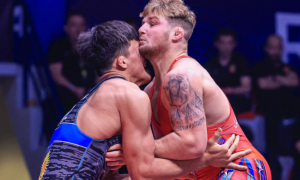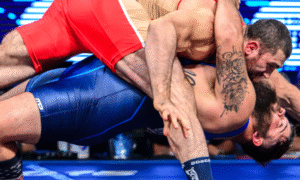Taylor LaMont (60 kg, Minnesota Storm) is not coming home from France with a medal but he still had some shining moments in his first overseas competition in more than two years.
Greco-Roman at the 2024 Henri Deglane Grand Prix of France in Nice began at 10:00am local time (4:00am ET) and streamed live on FFLutte.
LaMont was the lone USA athlete to enter the classical style this weekend although the Americans were certainly well-represented in the other two international disciplines. The key for LaMont — just as it is for the contingent of Seniors in Croatia — was to use today’s tournament and the experience overall to freshen up and prepare for more substantial matters coming in the spring, which for the Utah native is the Olympic Team Trials. A medal on Sunday might have provided a fleeting sense of validation for the trip but the much more important objective was simply matches, and in that regard LaMont got his money’s worth.
Opening in the round-of-16, LaMont faced Nambia’s Romio Goliath and engaged the hand-fight from the outset before unleashing a whammering headlock that scored four. Goliath answered with a correct-throw-arm-throw for two. They jousted through much of the period’s remainder following the maneuver with LaMont constantly but purposely turning up the pressure. There was no more scoring until the second frame when Goliath was deemed passive. From top, LaMont locked for a gutwrench and rotated three times to secure an 11-2 victory by way of technical superiority.
The quarterfinal brought forth a suitable challenger in ’19 World Champion/four-time medalist Nugzari Tsurtsumia of Georgia, who this season is attempting to garner his national federation’s favor by competing at 60 kilograms. It was LaMont who controlled the majority of this contest, thus relegating Tsurtsumia to a series of histrionics which dripped with frustration.
LaMont did not encounter much difficulty in dictating either the tempo or the real estate upon which both operated in the first period. He was commanding wrist control and prodding off of his ties to test arm drags as Tsurtsumia, considerably shorter by comparison, was content to crease inside with his head low. Thus, passivity, with LaMont the beneficiary. After settling his lock, LaMont was able to gutwrench the Georgian for two points and a 3-0 lead. Early in the second period, Tsurtsumia complained to the mat official about head contact, this despite him being the one to drop and lift his own cranium as if by compulsion. Nothing came of the gesturing, and they resumed. Tsurtsumia increased his output with a degree of urgency, which seemed to please LaMont. However, Tsurtsumia did wedge to wrangle shallow double underhooks, a potentially fruitful position. LaMont wanted to buck without bailing but soon found himself in a sprawl; Tsurtsumia bounded and spun for two points at the boundary to cut his deficit to 3-2.
After the reset, LaMont continued to press the issue more so than his opponent, who was trailing by a point. Snappy looks at arms drags were the directive, and LaMont had come close on two occasions to leveraging the setup for go-behind takedowns. Then with time a factor, Tsurtsumia once again found a window to sneak in double underhooks. LaMont countered with double overhooks and quickly hipped and pivoted as the pair were jockeying towards the line; but with one gasp of energy, Tsurtsumia jutted forward to collect a step-out point that was originally not scored until his corner had challenged. Upon the conclusion of the bout, Tsurtsumia pumped his fist as the winner via criteria, 3-3.
The tournament’s format did not observe a traditional repechage system, nor was it run using the Nordic System. It was, in a sense, a combination of both (similar to “wrestlebacks” in the US) with LaMont having a chance in the repechage prior to Tsurtsumia’s round-of-four match against Nikolai Mohammadi (DEN, who would go on to prevail 6-1).
In the first round of repechage, Mohamed Hkiri (TUN) received the opening passivity/par terre chance and capitalized on the position to lift LaMont for correct hold points. A reset, and then Hkiri went to unfurl an arm throw attack, but his attempt crumbled soon after it had enveloped and LaMont easily spun behind to earn a takedown before cranking a gutwrench. Another restart, and both wrestlers were scanning and checking into the hand-fight. Without so much as a cursory handle from which to work, LaMont soon walloped a waterfalling headlock to net four more points. His 8-3 lead sustained all the way until the conclusive stage of the battle — but, in an instant, near chaos. With less than two seconds hanging on the clock, Hkiri leapt into a “Flying Squirrel” variation and actually exposed LaMont on the action. LaMont did instantaneously reverse position, but the wildness of the exchange required a challenge. When the officials’ conference was complete, the point distribution was four for Tunisia and one for LaMont, who walked away the 9-7 victor.
One more match stood between LaMont and a chance for bronze. The antagonist this time around was Beso Makharadze (GEO).
True to form, LaMont walked out to the mat for the first period and, with his body language alone, set the terms. He was eating up ground against the taller Makharadze with nary an issue whilst shuffling into and out of the ties on his own volition. Passivity on Georgia — the only correct procedural decision in the match made without delay — allowed LaMont an opportunity work from top but his lift attempt could not gather elevation. Back on the feet, and Makharadze began trying to gain traction with underhooks, except his advances were met with crisp, convicted movement courtesy of his opponent. Neither athlete broke through on another score in the period.
Passivity flipped in the second and Makharadze locked around LaMont for a lift; LaMont nearly found his feet to stand, but the hold was nonetheless executed. It was nowhere close to exposure points — and at first glance did not fit the description of a rotational execution that, since a rule update in ’21, would still be awarded four points. Hayden Zillmer resided in LaMont’s corner and did not wait long to throw the challenge brick. Action on the mat continued, and Makharadze went on to score two more turns, piling up the requisite points for a stoppage. The officials then tended to the challenge from LaMont. The scoring was updated to 9-1 and Makharadze advanced to the bronze round where he was routed by Malkamu Fetene (ISR).
Prior to Sunday, the last time LaMont had competed overseas was at the ’21 U23 World Championships in Belgrade, Serbia (an impressive performance that culminated in a 5th-place finish). Following that event, LaMont, who was an NCAA All-American for Utah Valley, temporarily focused his athletic efforts towards the remainder of his collegiate endeavors and eventually closed that chapter of his career with the University of Wisconsin. He returned to Senior Greco-Roman competition this past December at the US Nationals in Fort Worth, Texas and qualified for the Olympic Team Trials.
2024 Henri Deglane Grand Prix of France
January 21 — Nice, FRA
Taylor LaMont (Minnesota Storm) — 7th
WON Romio Goliath (NAM) 11-2, TF
LOSS Nugzari Tsurtsumia (GEO) 3-3 (criteria)
WON Mohamed Hkiri (TUN) 9-7
LOSS Beso Makharadze (GEO) 9-1, TF

Listen to “5PM57: Kamal Bey and David Stepanyan” on Spreaker.
Listen to “5PM56: Rich Carlson and Spencer Woods” on Spreaker.
SUBSCRIBE TO THE FIVE POINT MOVE PODCAST
iTunes | Stitcher | Spreaker | Google Play Music





















